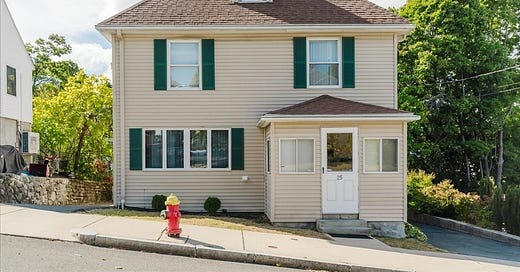There’s been a lot of talk floating around about changes to Mass Save’s program structure starting in 2025. I’m here today to directly reference the EEAC September 25th Draft, which I believe is close enough to 2025 to consider close to being final.
The people who we think this will impact the most are households in small housing units (e.g. 800 sq ft triple decker) and those who are looking to take out large HEAT loans1 ($25k+).
When will this take effect?
October 31st - EEAC supposed to submit final plan
Early 2025 - official DPU plan approval (current rules in place until official approval)
1. $10,000 Rebate will be Per Ton
11/21 note: we will be speaking against this rebate structure on 12/5 at the in-person Dept. of Public Utilities public hearing due to risk of a ton of oversized systems (see next section).
That’s right: the standard $10k heat pump rebate will now be adjusted based on system sizing. This means that a 2-ton system will now yield $6,000 in rebates for a market-rate household. This is referenced on Page 131 of the EEAC September 25th Draft Plan, for Tier 3 installations (which is a whole home installation):
We believe this is going to impact smaller homes, such as single-floor condo units in a Cambridge/Somerville triple decker, and newer homes with better insulation & lower heating loads. It’s worth nothing that the overall comfort & ongoing cost impact of a well-insulated home is probably worth more than, say, $3,000.
If you live in a ~2,000 sq ft home in the suburbs that already has a heating load of ~3 tons, then may not have as much of an impact.
That said/otherwise…
1.5. Expected More Oversized Systems in 2025
Ok, this one is half a takeaway, because it’s not explicitly from the Draft Plan. But I can see it coming from a mile away. Every other HVAC salesperson who doesn’t really care about design quality is going to instantly gravitate to a 3.5 ton system because that’s going to max out the rebate. And that’s bad, because a lot of these systems will be oversized, which results in higher heating bills due to short-cycling, and reduced efficiency + lifespan. And that will lead to complaining.
I don’t think this is the right way to go. I think Mass Save is better off keeping it a flat rebate, because they’re going to reduce the rebate amount starting in 2026 anyways.
2. The $10,000 Rebate Will Start Going Down in 2026
This is confirmed also on that Page 131 chart:
It’ll go down by $1,000 every single year. Both the maximum and the per-ton rebate goes down. So, I suspect you’ll hear a lot from HVAc companies telling you to sign now before the rebate goes down! & they’ll kind of have a point.
But do consider this: Mass Save is reducing incentives partly to reduce cost inflation in the market. So, arguably, if you wait, you may have more negotiating power, particularly if HVAC contractors end up lowering prices to match the (potentially slightly muted) levels of demand in the early winter as incentives go down.
3. HEAT Loans are Now Capped at $25,000
This is referenced on Page 10:
Yep, pretty straightforward there. So, if you have a rather large installation & you’re planning on putting it on a 0% loan, there may actually be a legitimate reason to act here.
Update: I’m told that the new Mass Community Climate Bank program could potentially help out with this. We’re looking into it, and will update this page when we know more.
3.5. Bonus: Heat Pump Water Heater Marketplace!!
I’m actually personally pretty excited about this one, because HPWHs are fairly modular in their design & installation and it’s a no-brainer to make this marketplace. You can see other companies like HomeBreeze doing flat rate on this, as well as Efficiency Maine’s easy marketplace search. Looking forward to seeing this launch.
So, should I get my heat pump installed now?
If you’re in a smaller home: yes. You may get a few thousand more out of it.
If you have a big installation and want to guarantee a $25k+ HEAT loan for it: yes
If you really want a Mitsubishi system: yes
An aside about Mitsubishi’s market forecast:
Mitsubishi, to our knowledge, doesn't have domestic production capacity for their heat pumps. Which means that if the Trump admin decides to jack up tariffs to 20% globally on 1/20/25, prices might go up later in 2025. Our intel is that distributors are stockpiling R410A equipment right now, and it's likely that Mitsubishi's R32 systems won't be available for half a year.
You'd see the prices go up on the distributor end probably heading into next summer. (Remember: it's manufacturer → distributor → installer → you.) We expect a 25% equipment price towards the end of next year compared to right now, in the worst case scenario.
My general takeaway is that it’s logical Mass Save is starting to focus on fiscal sustainability; this whole thing is a seriously expensive program in the billions, and we’re not going to have it forever. I’d rather not see the per-ton incentive model, however; it’s going to incentivize contractors to oversize A LOT. There will be soooooo many oversized systems out there next year.
Charitably, this may start putting some pressure on contractors to lower prices. But we’ll see if that really happens. Until then, we plan on publishing more pricing benchmarks for public benefit, hopefully aiming for 2 or 3 more new ones next year.
Note: Mass Community Climate Bank is potentially stepping in to help with this! It’s a new program, and we’re looking into it.









